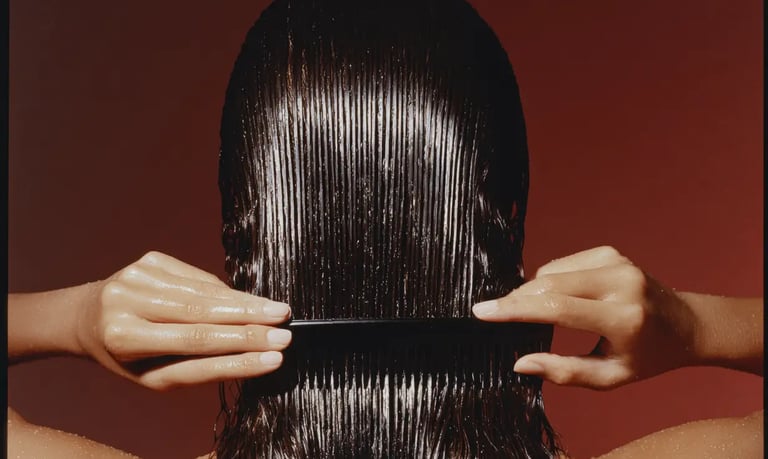Ditch the Toxins: A Smarter Way to Pick Your Shampoo
CONSUMERISMWELLNESS


Walking down the haircare aisle, it is easy to be drawn in by sleek packaging and promises of silky, voluminous locks. But have you ever taken a closer look at what is actually inside your shampoo? Many mainstream brands are packed with harsh chemicals that strip your hair of natural oils, irritate the scalp, and could even impact your long-term health. If you are looking to make better choices, knowing which ingredients to avoid and what to look for can help you transition to a healthier haircare routine.
Why Shampoo Ingredients Matter
Your scalp is an extension of your skin, and just like you pay attention to what goes into your skincare products, the same care should apply to your shampoo. Many hair issues—such as dryness, irritation, excess oil production, and dullness—are often linked to the ingredients in conventional shampoos. Choosing a cleaner shampoo not only benefits your hair but can also contribute to overall well-being by reducing exposure to unnecessary toxins.
Ingredients to Avoid in Shampoo
1. Sulfates (SLS and SLES)
Sodium Lauryl Sulfate (SLS) and Sodium Laureth Sulfate (SLES) are harsh detergents responsible for the foamy lather that many shampoos create. While they effectively remove dirt and oil, they also strip the scalp of its natural protective barrier, leading to dryness, frizz, and irritation. Sulfates can be particularly damaging to coloured or chemically treated hair, causing colour to fade more quickly.
2. Silicones
Silicones coat the hair, giving it a temporary smooth and shiny appearance. However, many silicones are not water-soluble, meaning they build up over time and require stronger detergents (often sulfates) to be washed out. This cycle can leave hair feeling greasy, weighed down, or excessively dry once the buildup is removed.
3. Parabens
Parabens are synthetic preservatives used to extend the shelf life of cosmetic products. While they help prevent bacterial growth, concerns have been raised about their potential hormone-disrupting effects. Some studies suggest parabens can mimic oestrogen in the body, which is why many people opt for paraben-free haircare alternatives.
4. Artificial Fragrances
A pleasant-smelling shampoo might seem harmless, but synthetic fragrances often contain undisclosed chemical blends that can trigger scalp irritation, allergies, or sensitivities. Many brands use the vague term "fragrance" on ingredient lists, which can mask harmful additives. Opting for shampoos scented with natural essential oils can be a safer alternative.
5. Formaldehyde-Releasing Preservatives
Some preservatives, such as DMDM Hydantoin and Diazolidinyl Urea, slowly release formaldehyde over time. Formaldehyde is a known irritant and has been linked to long-term health concerns. Checking labels carefully can help you steer clear of these hidden chemicals.
6. Phthalates
Phthalates are often used in haircare products to help fragrances last longer and improve product consistency. However, they have been associated with potential endocrine disruption and have even been banned in some countries. Choosing phthalate-free shampoos is a safer bet for your health.
7. Alcohols
Not all alcohols are bad, but short-chain alcohols like Isopropyl Alcohol and Ethanol can be extremely drying, leading to brittle hair. If your hair feels overly dry or frizzy after washing, check the ingredient list for these alcohols.
What to Look for in a Healthy Shampoo
If you want to transition to cleaner haircare, here are the best ingredients to look for:
1. Sulfate-Free Cleansers
Gentler alternatives such as Cocamidopropyl Betaine, Decyl Glucoside, and Sodium Cocoyl Isethionate effectively cleanse without stripping away natural oils. These are especially beneficial for those with sensitive scalps, curly hair, or colour-treated hair.
2. Natural Oils and Extracts
Shampoos enriched with natural ingredients like argan oil, coconut oil, aloe vera, shea butter, and chamomile extract help to nourish and protect the scalp. These ingredients promote hydration, enhance shine, and can even soothe irritated skin.
3. Water-Soluble, Lightweight Conditioners
Look for shampoos with hydrolysed proteins, plant extracts, and lightweight conditioning agents that provide moisture without causing buildup. These ingredients help maintain soft, manageable hair without the need for silicones.
4. Plant-Based Preservatives
Instead of parabens and formaldehyde-releasing chemicals, some natural shampoos use preservatives derived from plants, such as radish root ferment, potassium sorbate, or sodium benzoate.
5. Essential Oils for Fragrance
Instead of synthetic fragrances, opt for shampoos that use essential oils like lavender, peppermint, or tea tree oil. These not only provide a pleasant scent but can also offer added benefits like scalp stimulation and antibacterial properties.
Making the Switch: What to Expect
Switching from conventional shampoos to a healthier alternative can take some time, especially if your hair has been accustomed to silicones and sulfates. Here’s what you might experience:
Adjustment Period – Your scalp might take a few weeks to rebalance its natural oil production. Some people experience increased oiliness or dryness initially, but this usually stabilises.
Lack of Lather – Sulfate-free shampoos do not produce the same rich lather, but this does not mean they are not cleansing effectively. Massage the product well into your scalp for the best results.
Improved Hair Health – Over time, your hair will likely feel softer, stronger, and more manageable, with a healthier scalp to match.
Final Thoughts
Making informed choices about your haircare is not just about achieving great hair—it is also about reducing exposure to harmful ingredients and prioritising your overall well-being. By avoiding harsh chemicals and opting for nourishing, natural alternatives, you can create a healthier routine that supports both your hair and your long-term health. Next time you pick up a shampoo bottle, take a moment to check the ingredients—it might just make all the difference for your hair and scalp.


